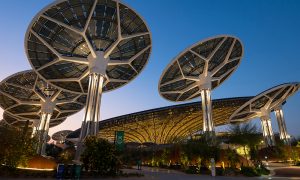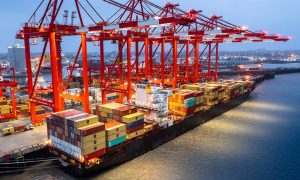Sustainable strategies in Middle East construction
Despite fiscal pressure due to low oil prices, construction businesses across the Middle East currently have cause to be positive about their prospects; on the back of increased investment in infrastructure, the sector is booming, with almost $3tn of projects at design, bid or construction stage over the next decade. Over half of these are already in the construction phase, including a number of high-profile developments, such as the 2022 World Cup in Qatar. However, the focus is now on sustainable and environmentally responsible projects, right across the region.
This should not come as a surprise. While the Middle East has attracted its share of criticism from ecologists for the central role it plays in the oil industry, the scarcity of other resources means the region has long been ahead of the curve in terms of matching development to sustainability. The UAE places sustainability near the top of its policy agenda, boasting the highest share of green buildings in the Middle East and North Africa, and Abu Dhabi Sustainability Week is established as a leading global forum.
Last year, the Saudi Presidency of Meteorology and Environment (PME) announced a decree giving all companies five years to meet rigorous new air, water and noise pollution standards. In Qatar, social infrastructure projects have been given significant budgets to raise environmental living standards, and green codes of construction have been adopted for the building of World Cup infrastructure.
However, increasingly, global thinking on sustainability is shifting. No longer is it something that is tacked onto the end of a business or operational plan. It now seems to be the case that large projects must start from a sustainable proposition. So what does this look like, and how can the construction industry show leadership?
Time is ticking
The lesson of the last decade is that both business and society can no longer rely on small incremental changes. Companies need to incorporate sustainability as a core part of their business operations. Rather than a marketing add-on or a piece of brand positioning, it needs to be embedded at the heart of business operations at every level.
This is especially important for construction firms in the GCC. The largest developments will be government-funded, and governments are already sending distinct signals that only eco-friendly projects will get the go-ahead. Saudi Arabia has already made this the law, while Qatar has hinted that its Global Sustainability Assessment System (GSAS) could soon become mandatory. It may not be long before all construction companies have to be sustainable, which means building it in to business strategy from the start.
At the heart of the business
How can business embed sustainability as an integral part of strategy? In the past, becoming sustainable usually meant considering how to reduce resource use or emissions. Nowadays, companies are starting to ask bigger questions. Can they survive if natural resources become constrained? Do they rely on unsustainable commodities or natural resources? Does the company act responsibly?
These questions are central to business strategy. They are about whether a business can operate at all in the future. All evidence suggests that resources are getting scarcer, regulations – especially environmental ones – are becoming more stringent, and public opinion is becoming sterner on wastefulness. Policy-makers, in turn, are becoming stricter.
This means businesses cannot leave sustainability to the end of their business strategy; they must plan it in from the very start. Companies would be very short-sighted to hope that they can react to challenges as they arise. The time to start planning is now.
More than one bottom line
An increasingly common term now heard in business is the ‘triple bottom line’, meaning accounting for social and environmental outcomes as well as financial ones. How this is best achieved is still being debated, but it does recognise that there is an existing framework for how business can examine and evaluate the most effective ways to use and manage their resources – in the finance function.
Finance professionals are used to measuring and monitoring performance, and then reporting the results in a way that can inform strategic planning. This means that they are well placed to take a lead in managing risks and resources where sustainability is concerned.
There is an additional benefit to having such initiatives led from the finance function. Many businesses are wary of sustainability; they may have encountered it in the past as a vague piece of marketing or branding. They may even feel that it has little to contribute to sound business strategy.
For the construction industry, sustainable initiatives may even be seen as complicating or slowing business strategy. By taking the lead in this area, finance professionals can demonstrate that this is a concrete basis for long-term business planning, with real, tangible outcomes for success and real risks for failure.
No company is an island
Every business, regardless of size or sector, eventually needs to ensure that sustainability is at the heart of how they operate, if they are to respond to new challenges and manage risk. For the construction sector, which is at the front line of how we interact with our natural environment, the consequences may need to be faced more immediately than for other industries. However, in the long term this is a benefit, as it means putting in place strategies and safeguards that may come as a shock to other industries in the future.
The only way businesses can survive in the long term is by delivering long-term benefits for society and a light touch to the natural environment. Many companies are experts at planning for their business environment – it is perhaps time to consider that this only exists as part of the wider world.
Michael Armstrong is regional director at ICAEW in the Middle East, Africa and South Asia.























